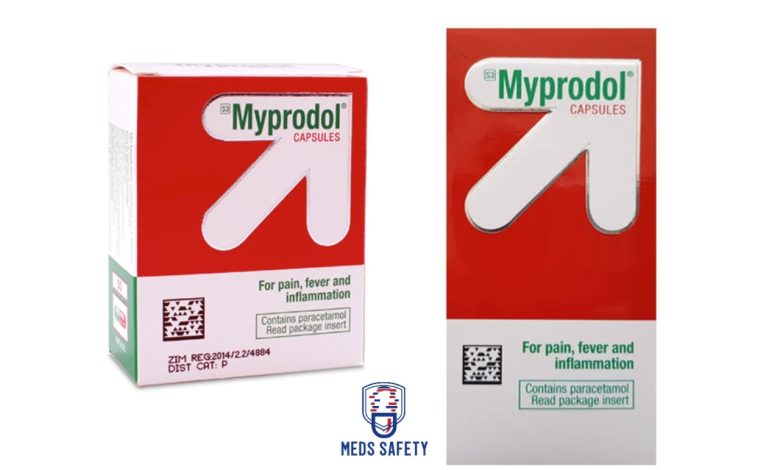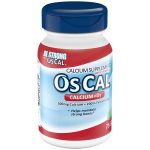Myprodol Capsules: Uses, Dosage, Benefits, Side Effects, Interactions

Myprodol is a South African brand name for a medication that contains a combination of active ingredients, namely paracetamol, ibuprofen, and codeine. It is commonly used as an analgesic (pain reliever) and antipyretic (fever reducer).
Paracetamol and ibuprofen work by reducing pain and fever, while codeine is an opioid analgesic that provides additional pain relief. Myprodol is typically prescribed for the temporary relief of moderate to severe pain, such as that caused by headaches, dental pain, menstrual pain, and musculoskeletal conditions.
Each capsule of Myprodol contains codeine phosphate 10 mg Ibuprofen 200 mg, and paracetamol 250 mg. This medication is very common in Zimbabwe and other countries in Southern Africa.
Dosage and Directions for Use
The dosage and directions for use of Myprodol can vary depending on the specific formulation and country’s prescribing guidelines. Myprodol is not recommended for children under twelve years of age.
The recommended dosage for adults is one to two capsules of Myprodol every four hours, or as directed by your healthcare professional. Do not exceed a total of twelve capsules within a twenty-four hour period. It is important to follow the prescribed dosage and not take more than the recommended amount.
Take the Myprodol capsules orally with a full glass of water. It is often recommended to take Myprodol with or after food to help minimize the risk of stomach upset. However, please follow the specific instructions provided by your healthcare professional or those on the medication label.
If you experience pain or discomfort and find that the recommended dosage does not provide relief, it is important to consult your doctor or healthcare professional. Your doctor can assess your condition, determine the appropriate course of action, and adjust the dosage if necessary.
It is important to note that the information provided above is a general explanation based on the details you provided. Always consult your healthcare professional or pharmacist for the most accurate and up-to-date dosage and usage instructions specific to your condition and the formulation of Myprodol available to you.
Pregnancy and Lactation
• Myprodol capsules are not recommended for use by pregnant or breastfeeding women.
• Regular use of non-steroidal anti-inflammatory drugs (NSAIDs) during the third trimester of pregnancy may result in premature closure of the fetal ductus arteriosus and persistent pulmonary hypertension of the newborn. It may also delay the onset of labor and prolong its duration.
Side Effects of Myprodol Capsules
Myprodol capsules have the potential to cause various side effects. Some of the reported side effects include:
1. Fluid Retention and Heart Failure: Due to its inherent potential to cause fluid retention, Myprodol may precipitate heart failure in compromised patients.
2. Gastrointestinal Effects: Peptic ulceration and gastrointestinal bleeding have been reported as side effects. Other gastrointestinal-related side effects include dyspepsia, nausea, and abdominal discomfort.
3. Central Nervous System Effects: Dizziness, nervousness, depression, drowsiness, insomnia, and blurred vision are among the possible side effects affecting the central nervous system. Tinnitus (ringing in the ears) and other ocular reactions have also been reported.
4. Hypersensitivity Reactions: Some individuals may experience hypersensitivity reactions, such as skin rash, itching (pruritus), and urticaria.
5. Liver and Kidney Function: Abnormalities in liver function tests and impairment of renal function have been reported. Acute reversible renal failure has also been documented. Caution should be exercised when using Myprodol in patients with impaired renal function.
6. Hematological Reactions: Agranulocytosis (a severe drop in white blood cells) and thrombocytopenia (a decrease in platelet count) have occasionally been reported. Sensitivity reactions leading to reversible skin rash or blood disorders may occur.
7. Codeine-Related Effects: Codeine phosphate, one of the active ingredients in Myprodol, may cause various side effects, including nausea, vomiting, constipation, drowsiness, confusion, dry mouth, sweating, facial flushing, vertigo, bradycardia (slow heart rate), palpitations, orthostatic hypotension (drop in blood pressure upon standing), hypothermia, restlessness, mood changes, and miosis (excessive constriction of the pupil). It may also cause difficulty in urination and spasms in the ureter or biliary tract. Raised intracranial pressure is a potential complication. Allergic reactions like urticaria (hives) and pruritus (itching) may occur.
8. Precautions for Specific Conditions: Codeine phosphate should be used with caution in patients with hypothyroidism, adrenocortical insufficiency, impaired liver function, prostatic hypertrophy, or shock.
It is important to note that this is not an exhaustive list of side effects. If you experience any persistent or severe side effects while taking Myprodol capsules, it is advisable to seek medical attention promptly.
Contraindications
• Myprodol is contraindicated in individuals with impaired hepatic and renal function.
• It should not be used in patients with a history of peptic ulceration or those currently experiencing peptic ulceration.
• Individuals with cardiovascular disease should not take Myprodol.
• Hypersensitivity or allergy to any of the active ingredients in Myprodol is a contraindication.
• It is contraindicated in cases of respiratory depression, particularly when cyanosis (bluish discoloration) and excessive bronchial secretion are present.
• Myprodol should not be administered after operations on the biliary tract, during acute alcoholism, in cases of head injuries, or when intracranial pressure is elevated.
• It is contraindicated during an asthma attack or in cases of heart failure secondary to chronic lung disease.
• Myprodol should not be taken by patients who are currently taking or have recently stopped monoamine oxidase inhibitors (MAOIs).
• Caution is advised for patients receiving coumarin anticoagulants.
• Individuals who are sensitive to aspirin should avoid taking Myprodol capsules.
Warnings and Special Precautions
• The safety of continuous use of Myprodol capsules for more than four weeks has not been established.
• Codeine, one of the active ingredients, can lead to dependency and addiction when exceeding the prescribed dose or with prolonged and continuous use.
• Paracetamol, another active ingredient, can cause severe liver damage when taken in dosages exceeding the recommended limits.
Interactions
Myprodol can potentially interact with other medications, and it is important to be aware of these interactions to prevent any adverse effects. Here are some known drug interactions associated with Myprodol:
1. Monoamine Oxidase Inhibitors (MAOIs): Myprodol should not be taken by individuals who are currently taking or have recently stopped using MAOIs. Combining Myprodol with MAOIs can lead to serious, potentially life-threatening interactions.
2. Warfarin and Other Anticoagulants: Caution should be exercised when combining Myprodol with coumarin anticoagulants (such as warfarin) due to the potential for increased bleeding risk. Regular monitoring of coagulation parameters may be necessary.
3. Other Non-Steroidal Anti-Inflammatory Drugs (NSAIDs): Concurrent use of Myprodol with other NSAIDs (such as aspirin, ibuprofen, or naproxen) may increase the risk of gastrointestinal bleeding and adverse effects on the kidneys. It is generally recommended to avoid using multiple NSAIDs simultaneously.
4. Medications Affecting Renal Function: Myprodol, particularly its ibuprofen component, may have an impact on renal function. Combining it with medications that also affect the kidneys, such as diuretics, ACE inhibitors, or angiotensin receptor blockers, may increase the risk of kidney problems. Close monitoring of renal function is advised in such cases.
5. CNS Depressants: Myprodol, containing codeine, can enhance the sedative effects of other central nervous system (CNS) depressants, such as benzodiazepines, opioids, alcohol, or certain antidepressants. Combining these substances can lead to increased drowsiness, respiratory depression, and impaired coordination.
6. Medications Affecting Liver Function: Myprodol contains paracetamol, which is metabolized by the liver. Concurrent use of Myprodol with medications that can affect liver function, such as certain antiepileptic drugs or hepatotoxic substances, may increase the risk of liver damage. Regular liver function monitoring may be necessary.
7. Other Interactions: Myprodol may also interact with certain medications used to treat hypertension (high blood pressure), certain psychiatric medications, and some herbal supplements. It is important to inform your healthcare provider about all the medications, supplements, and herbal products you are taking to avoid potential interactions.
Remember, this is not an exhaustive list of drug interactions, and there may be other medications that can interact with Myprodol. It is crucial to inform your healthcare provider about all the medications you are taking to ensure the safe and effective use of Myprodol. They can provide you with personalized advice based on your specific situation.





